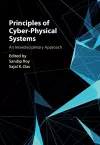
Principles of Cyber-Physical Systems
2 contributors - Hardback
£135.00
Sajal K. Das is a professor of Computer Science and Daniel St. Clair Endowed Chair at Missouri University of Science and Technology, USA, where he was Computer Science Department Chair from 2013 to 2017. Prior to 2013 he was a University Distinguished Scholar Professor of Computer Science and Engineering at UT Arlington, USA. He also served as a NSF Program Director in 2008–2011. His research interests include IoT, big data analytics, security, cloud computing, wireless sensor networks, mobile and pervasive computing, cyber-physical systems and smart environments, biological and social networks, and applied graph theory. He has directed high-profile, funded projects and published over 700 papers in journals and conference proceedings. He holds 5 US patents, and has co-authored 52 book chapters and 4 books. A recipient of 10 best paper awards, Dr. Das has also received numerous awards for teaching, mentoring and research including IEEE Computer Society Technical Achievement Award for pioneering contributions to sensor networks and mobile computing. He is the founding editor-in-chief of the Pervasive and Mobile Computing journal, and associate editor of several other journals. He is an IEEE fellow.
Nabendu Chaki is a professor at the Department of Computer Science & Engineering, University of Calcutta, Kolkata, India. He shares seven international patents including four US patents. In addition to nearly 30 edited volumes with Springer, Dr. Chaki has authored 7 text and research books and more than 150 Scopus Indexed research papers in journals and at international conferences. Nabendu has been a visiting professor at various institutions, including Naval Postgraduate School, USA; Ca' Foscari University, Italy and AGH University of Science and Technology in Poland. He is the founder Chair of the ACM Professional Chapter in Kolkata and served in that capacity for 3 years from January 2014. In 2009–2015 he was active in developing several international standards in software engineering and service science as a global (GD) member of ISO-IEC.